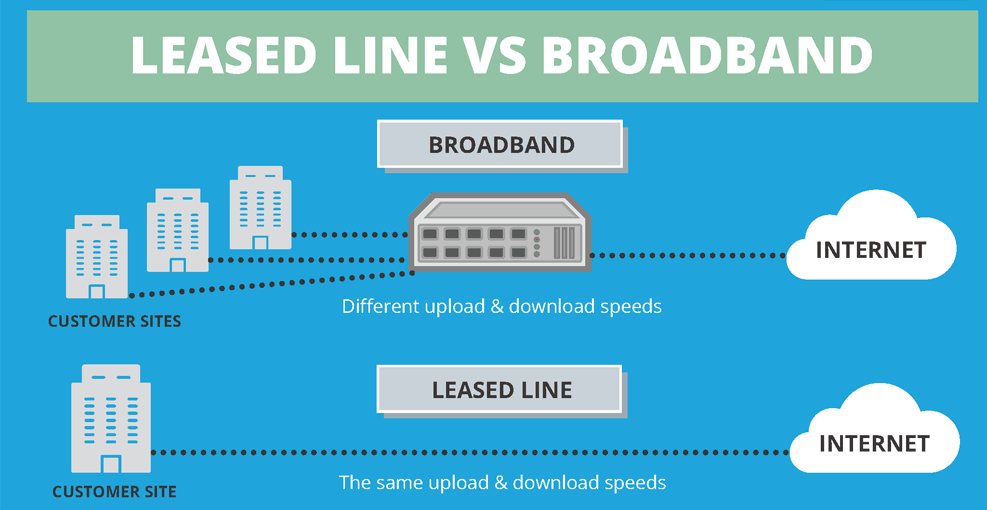Leased Line vs Broadband: Which is Better for Your Business?
- 1 Leased Line vs Broadband: Which is Better for Your Business?
- 1.1 Speed and performance
- 1.2 Reliability
- 1.3 Service level agreements (SLAs)
- 1.4 Cost
- 1.5 Scalability
- 1.6 Security
- 1.7 Customer support
- 1.8 Usage patterns
- 1.9 Network congestion
- 1.10 Latency
- 1.11 Installation and setup
- 1.12 Bandwidth utilisation
- 1.13 Redundancy
- 1.14 VoIP services
- 1.15 Cloud-based applications
- 1.16 Remote work
- 1.17 Competitive advantage
- 1.18 International Business
- 1.19 Overall cost-benefit analysis
- 2 Ending note
Are you a business owner struggling to decide between a leased line and broadband for your internet needs? Do you find yourself asking, “What is a leased line, and how does it compare to broadband?” However, with so many alternatives available, selecting the ideal one might be difficult. Let’s go into the intricacies of leased lines and broadband, focusing on their advantages and disadvantages so you can make an informed selection.
Leased Line vs Broadband: Which is Better for Your Business?

Speed and performance
A leased line provides a dedicated internet connection with symmetrical speeds, meaning the upload and download speeds are the same. This is especially important for organizations that rely on the availability and speed of internet connection for activities such as video conferencing, file transfers, and cloud work, among others. Broadband can be defined as broadband, which is a way of transmitting internet with unequal speeds, where the speed of downloading is higher than that of uploading. Broadband speeds can also be fast, but they can be slow depending on the amount of traffic within the network at a given time, a factor that affects the performance of your business during busy hours.
Reliability
Leased lines are known for their reliability. Unlike other connections that are available on the internet, the connection you have is dedicated to your business. Therefore, you do not have to share your bandwidth with other users. This makes the experience more constant and stable when it comes to the usage of the internet. Fixed broadband connections, especially those that are used jointly with residential customers, can decrease their speed and stability during peak times. This is disruptive in business because some forms of work entail the use of the Internet.
Service level agreements (SLAs)
One of the major advantages of leased lines is the Service Level Agreement (SLA) that comes with them. SLAs provide quality, availability, and response time assurance in the event of a problem. This helps avoid frequent breakdowns and, in case of breakdowns, acts as a means of correcting the problem and thus cutting down on losses. Broadband providers usually do not provide as detailed SLAs as the ones provided by this cover. Hence, your business may be locked out for a considerable time if there is a problem.
Cost
The leased lines are more costly than the broadband links. The higher cost is attributed to the fact that the service is more focused and thus delivers the results more effectively and efficiently. However, this cost can be justified in the instance that the business relies so much on the Internet. Broadband is cheaper and might be appropriate for small businesses that use the internet to a moderate extent.
Scalability
Leased lines also have the advantage of great scalability. With the cloud model, it is very easy to scale up your business without having to make any changes to your architecture. This flexibility helps to guarantee that your internet connection is always adequate to your business needs. Broadband services might not be as scalable as dial-up services, and getting an upgrade may entail some nasty surprises and procedures.
Security
Security is a critical concern for businesses. Leased lines also offer more security than other forms of internet connectivity since they are exclusive to your business, thus making it difficult for hackers to penetrate your system. The usage of broadband connections can be riskier, especially if the connection is a shared connection. The security aspect cannot be overlooked; however, the leased line is naturally secure.
Customer support
When it comes to leased lines, the businesses are typically provided with superior customer service. Leased line customers are given priority because providers know that any problems have to be resolved immediately. Broadband services, as they provide customer support, may not give preference to business users as much. The ability to get internet issues resolved quickly is crucial for business continuity, and the superior support of leased lines is invaluable.
Usage patterns
For businesses that have heavy data usage and rely on continuous, high-speed internet, leased lines are the better choice. They are capable of processing large amounts of information without any degradation of performance. While broadband may be adequate for low-traffic business use, it might get bogged down and slow down or even stop under heavy usage.
Network congestion
Leased lines are not affected by network congestion because the bandwidth is exclusively reserved for your business operations. This means that irrespective of the number of users that are online in your region, your internet speed will not be affected. Fixed broadband, particularly in areas with high population density, can be constrained by congestion, meaning your internet connection may be slower during certain hours, which will impact your business.
Latency
Activities such as video conferencing and VoIP calls require low latency. Due to the dedicated nature of leased lines, they provide low latency, hence making communication smooth and continuous. Unlike traditional connections, broadband connections can be slower and have higher latency during peak hours, which is a problem for real-time communications and productivity.
Installation and setup
Leased line installation can take more time and may be slightly cumbersome than broadband installation. It entails installing exclusive telephone lines for your business premises, a process that can take several weeks. But again, this initial investment in terms of time and effort is well justified in the long run by the improved performance levels. Broadband installation is usually faster and less complicated than other forms of installation, which makes it more convenient for businesses that require an instant solution to their Internet connection.
Bandwidth utilisation
Leased lines provide dedicated bandwidth, meaning that you will get the internet speed you are always paying for. This is important, particularly to firms that strongly depend on internet connection. Because broadband connections are shared, the speeds at which data is transmitted are likely to be lower during peak usage, which is not friendly to businesses that require fast connections.
Redundancy
For redundancy solutions, organisations which cannot afford any disruption should consider leased lines. Leased line service providers provide backup solutions like backup connections to ensure that the internet connection is permanently active. Broadband services do not offer as much redundancy as dial-up services and, therefore, are not as beneficial to companies that require a lot of Internet connectivity.
VoIP services
If you are a VoIP service provider, then you should opt for a leased line because of the low latency and high reliability. Leased lines provide clear and uninterrupted voice communication, which is vital to the running of any business. Fixed broadband connections also have the disadvantage of delivering poor voice quality and dropping calls, which hampers communication.
Cloud-based applications
To many organisations that depend on cloud-based applications, leased lines offer the required bandwidth, consistency as well as safety. Some of the requirements that should be met include the ability to access cloud services quickly and securely. Internet connections could be slow or unstable, and this may affect the speed and security of the usage of cloud applications.
Remote work
Thanks to the development of technological tools, the importance of a stable Internet connection has become even more significant. Leased lines are beneficial for efficient remote work as they provide a constant data rate; thus, employees can access needed materials without interference. This is so because broadband is comparatively slower and can be inconsistent at times; this would be disruptive for workers who do their tasks online and thus affect productivity.
Competitive advantage
The availability of a good and fast internet connection can be a competitive strength. Leased lines guarantee that your business processes are uninterrupted, thus improving the productivity of the business. This might not be the case with broadband connections that may, at times, be slower and even prone to interruptions, which are not suitable for business in a competitive environment.
International Business
To business organisations with international operations, the leased line provides the security and speed that is required for communications and business transactions across the world. Fluctuating internet connectivity is not suitable for handling international clients and partners, and thus, it has to be consistent. It can be argued that broadband does not provide the same level of performance which could influence international business operations.
Overall cost-benefit analysis
While the initial cost of leased lines is more significant, the long-term benefits in terms of dependability, performance, and support may surpass these expenses. For firms that rely significantly on the Internet, this investment can result in enhanced operations and profitability. Broadband is initially more economical, but unexpected performance difficulties and downtime might result in hidden expenses that reduce corporate effectiveness.
Ending note
Your business’s demands determine whether you should use a leased line or broadband. If your company depends significantly on a consistent, high-speed internet connection, investing in a leased line may bring substantial benefits such as dependability, scalability, and exceptional service. For smaller enterprises or those with less stringent internet requirements, broadband may be a more cost-effective solution. By analysing the advantages and disadvantages of each, you can make an informed selection that best supports your company’s operations and growth.
















